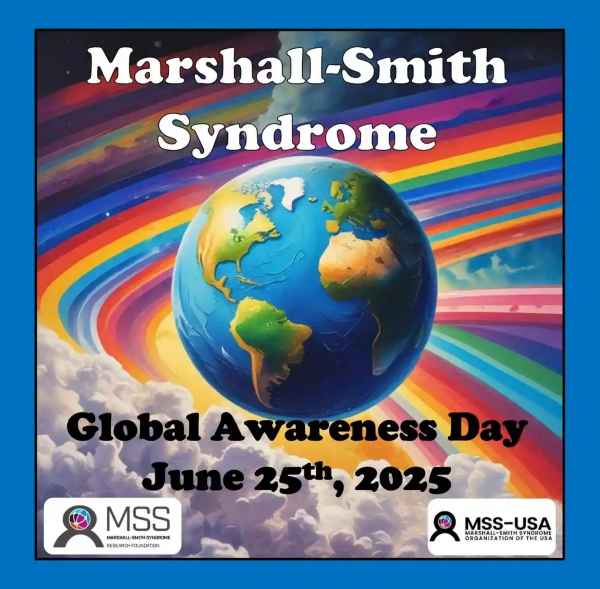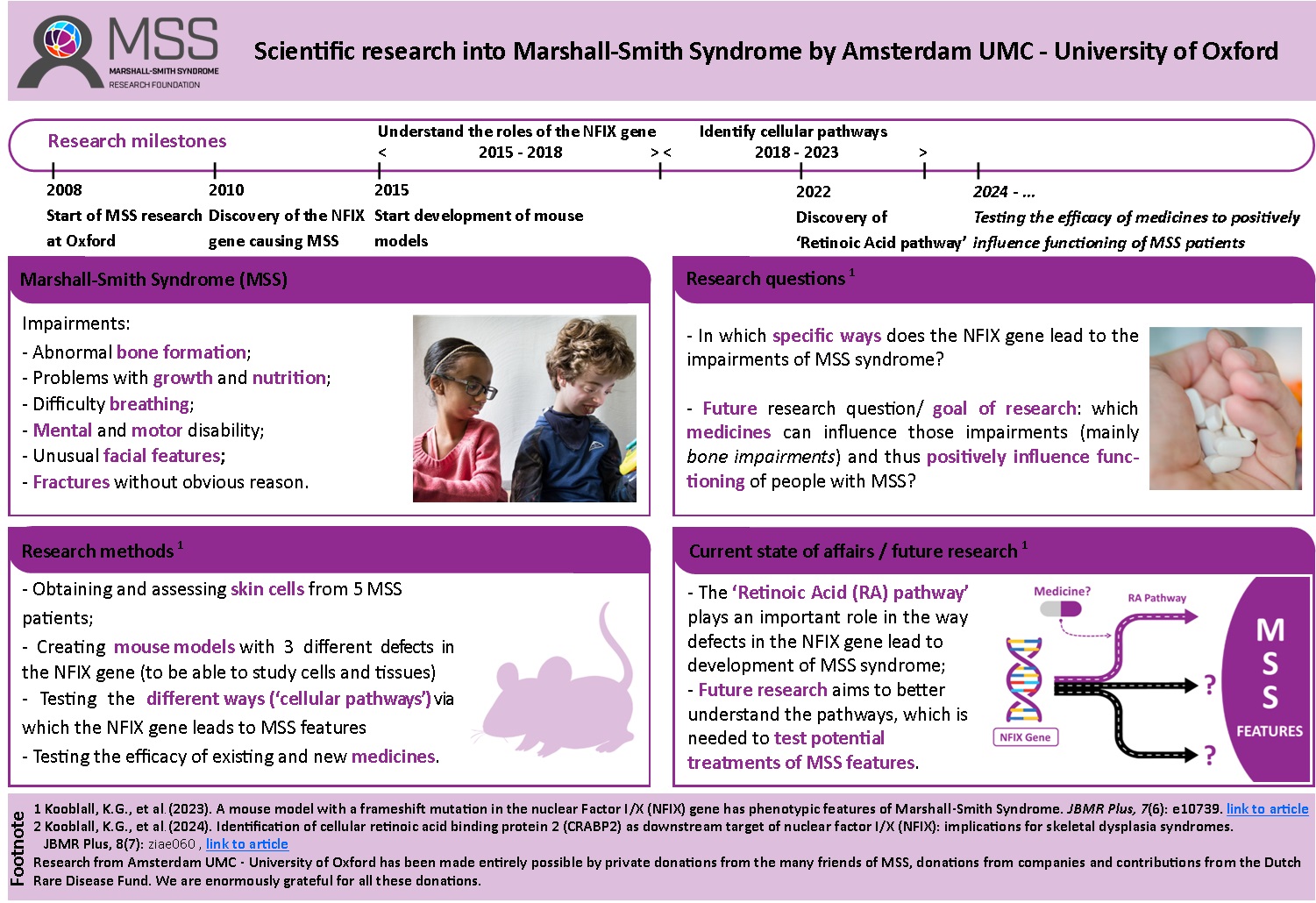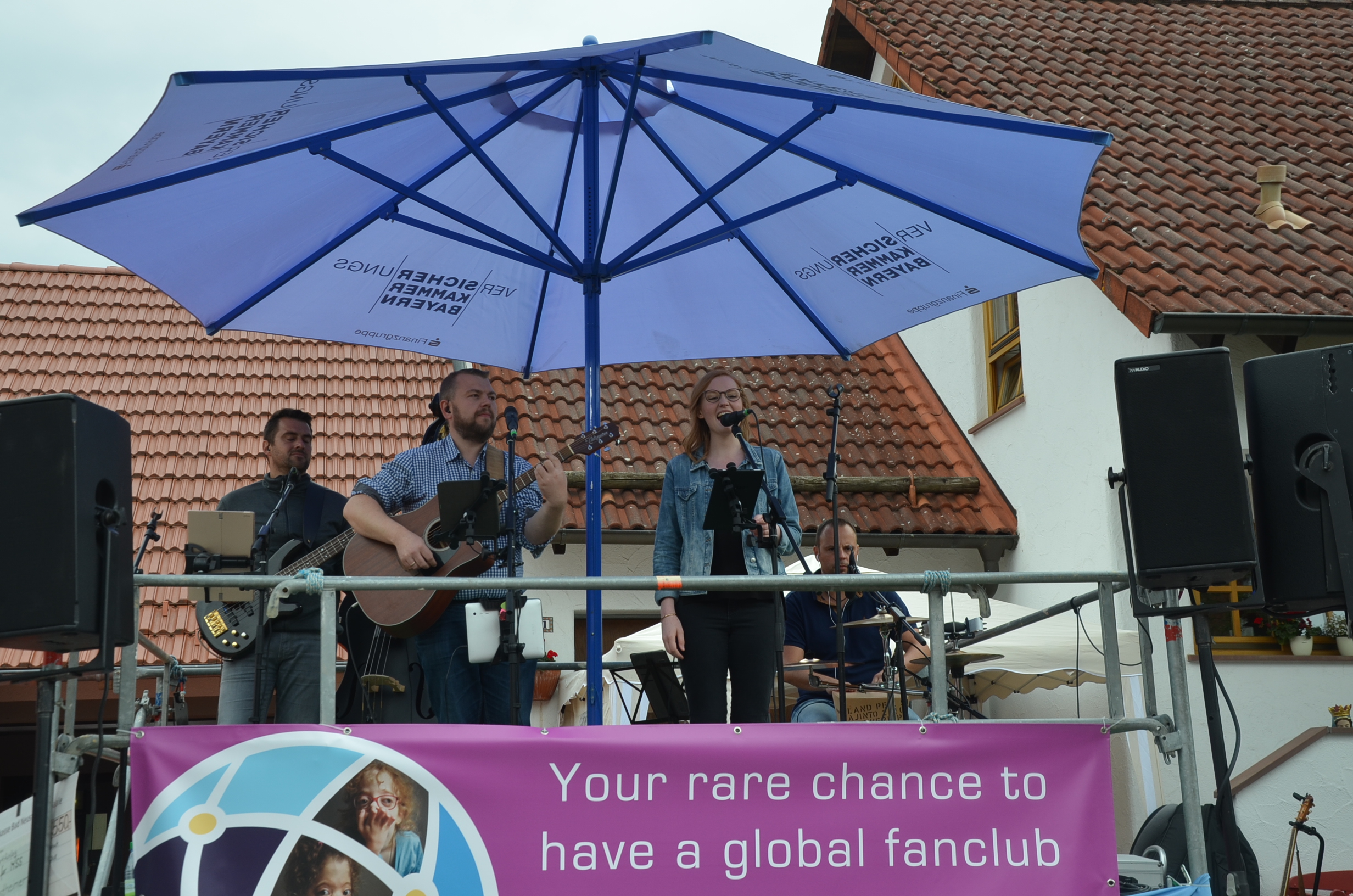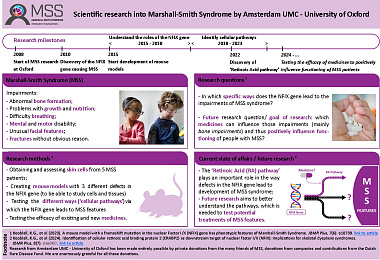Recently, the MSS Foundation has drawn up a new research agenda for the coming years. This was achieved in collaboration with our partners and advisors from MSS-USA, Oxford, and Amsterdam UMC. The research being conducted in Oxford by Amsterdam UMC and the University of Oxford is continuing because it offers promising leads. We are also intensifying our collaboration with the Amsterdam UMC Expertise Center. The MSS Foundation is contributing €70,000 to research coordinated by Amsterdam UMC, focusing on two core areas:
- Clinical work towards updated standards of care:

- Construct MSS castor database to gather data of individuals with MSS worldwide
- Data collection
- Set up multidisciplinary team(s) to cover all organ system; publish updated standards of care.
An important goal is that this will lead to a new standards of care with a mix of scientific information and information from practice and the experience of families worldwide, which will help to support daily life with MSS as well as possible.
2. Coordinate work on fundamental research - model systems:
- Construct MSS Biobank (as part of the Emma CPM Biobank)
- The development of iPSCs (stem cells) to study disease mechanisms at Amsterdam UMC.
- Gather samples to construct MSS episignature. For some, this can be supportive in the diagnostic process, as it provides more clarity when the genetic diagnosis is not (yet) clear.
From left to right: Rianne Kruize (physician-researcher), Anissa Leening (medical student),
Hidde Bout (physician-researcher), Dr. Leonie Menke (Medical Specialist, General Pediatrics),
Dr. Sylvia Huisman (intellectual disability physician), Hafsa Ahajan (physician).
A research team has been formed at Amsterdam UMC under the leadership of Dr. Leonie Menke and Dr. Sylvia Huisman. Rianne Kruize has been appointed as a physician-researcher (PhD) and has already begun the initial stages of this research. All the physicians and researchers involved also attended the MSS Family Weekend last June, where they spoke with all the families present.
We are extremely pleased with these new steps and the intensive collaboration with Amsterdam UMC. Our contribution to this research of €70,000 comes entirely from private contributions from all sponsorship campaigns and donations from friends and donors of the MSS Foundation, for which we are extremely grateful.
The MSS Family Weekend 2025 was once again a great success! No fewer than ten families gathered at the beautiful location ‘De Kindervallei’ in Valkenburg from Friday June 20th till Mondaymorning 23rd to meet and inspire each other.
The enthusiastic families received a warm welcome (both literally because of the tropical temperatures that weekend and figuratively) and enjoyed three days of meetings, gatherings, relaxation, delicious food, and fun activities. Researchers were also present to hold personal consultations with the families. This was extremely valuable!
All this was made possible by a large group of volunteers to whom we are very grateful. They organized fun activities for the siblings, provided meals and gave the parents a break when they wanted to relax. To strengthen the connection between the families and researchers, interpreters were present for the families who needed them. This was our 8th MSS Family Weekend.
We are looking forward to organize our next MSS Family Weekend in 2027.























 In the afternoon there was a lecture of the humangenetic Prof. Dr. Martin Zenker from the University of Magdeburg, who told about history of MSS and problems that childs actually have. There was also a dancing group from the Lebenshilfe and a solo guitar artist. Furthermore, a shepherd brought some goats. The children could stroke them and he teached the children how important nature and animals are for human being. Then the Band “For the song” entertained the visitors while a good friend of the family and Beer-sommelier Andy Seufert presented his newest receipts and creations of beer.
In the afternoon there was a lecture of the humangenetic Prof. Dr. Martin Zenker from the University of Magdeburg, who told about history of MSS and problems that childs actually have. There was also a dancing group from the Lebenshilfe and a solo guitar artist. Furthermore, a shepherd brought some goats. The children could stroke them and he teached the children how important nature and animals are for human being. Then the Band “For the song” entertained the visitors while a good friend of the family and Beer-sommelier Andy Seufert presented his newest receipts and creations of beer. On December 15, 2017 the MSS Research Foundation existed exactly 10 years. We are extremely grateful that the foundation has been able to do so much for children and adults with MSS and their families over the past 10 years. We celebrated this with a wonderful afternoon in CORPUS. Together we made a journey through man's body under the guidance of various experts in the field of MSS. We also looked back at what the foundation has been able to do for families with MSS in the past 10 years.
On December 15, 2017 the MSS Research Foundation existed exactly 10 years. We are extremely grateful that the foundation has been able to do so much for children and adults with MSS and their families over the past 10 years. We celebrated this with a wonderful afternoon in CORPUS. Together we made a journey through man's body under the guidance of various experts in the field of MSS. We also looked back at what the foundation has been able to do for families with MSS in the past 10 years.



